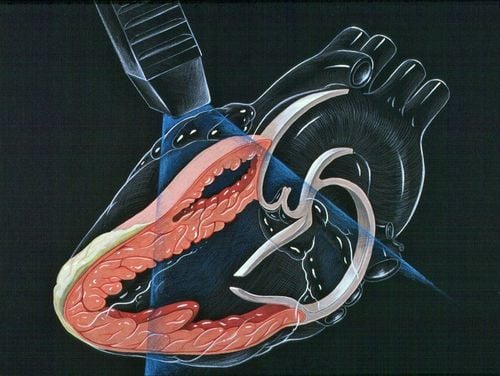This is an automatically translated article.
The article is professionally consulted by Master, Doctor Cao Thanh Tam - Cardiologist - Cardiovascular Center - Vinmec Central Park International General Hospital.During a heart exam, in addition to the normal sounds, your doctor may hear sounds similar to air blowing through the mouth of a tube, called a heart murmur. A heart murmur can be a benign murmur, but most often in older children and adults, a murmur heard in the heart is often indicative of some cardiovascular disease.
1. Heart murmur
Heart murmurs are sounds that occur during the heartbeat cycle, such as hiss or rustles caused by uneven blood flow in or near the heart. These sounds can be heard with a stethoscope. A normal heartbeat produces two sounds, which are the sounds produced when the heart valves open and close.Heart murmurs can be present at birth (congenital heart disease) or develop later in life. A heart murmur is not a disease, but heart murmurs can be a sign of an underlying heart problem.
Clinically, people can hear:
Systolic murmur: is a murmur heard with pulse pulse time, diastolic murmur with pulse sinking time. Therefore, when listening to the heart, we need to coordinate with palpation, the murmur is continuously heard in both phases, but the pulse gradually increases at the end of systole and at the beginning of diastole. Diastolic murmur: usually occupies only part of the diastole and is closely heard for the second heart sound. Usually, a systolic murmur occurs immediately after the first heart sound, but because the ear can only distinguish between short periods of time, when listening to the heart, the systolic murmur takes up all of the systole, covering the whole heart. first language. Continuous murmur: no pause from end systole to early diastole.

2. Classification of heart murmurs
There are two types of heart murmurs: benign murmurs and abnormal murmurs.2.1 Benign murmur Benign murmur is usually harmless and is common in young children. These murmurs are just the sound of blood circulating in the heart. Your doctor can hear this heart murmur through a stethoscope. These murmurs will appear throughout the child's childhood. They usually last from the time the child is 3-7 years old and will disappear as the child gets older.
Approximately 75% of infants and 66% of young children have a harmless heart murmur. Several forms of benign heart murmur:
Still murmur is the most common harmless heart murmur. This murmur is usually heard on the left side of the chest bone. This murmur is often difficult to detect when the child is sitting or lying down. A pulmonary murmur is usually heard when blood flows through the pulmonary artery. A venous murmur is usually heard when blood flows through the jugular vein, near the collarbone. The doctor must check the pulse in the child's collarbone to determine it. Benign heart murmurs tend to vary in intensity with the child's position. In addition, they are usually heard in one spot and do not move or spread to other places such as the neck, armpits, or back. 2.2 Abnormal murmurs When heart murmurs are related to structural problems of the heart or congenital heart defects such as narrowed heart valves, holes in the heart, abnormal heart valves, etc., these murmurs are considered is an abnormal murmur (pathological murmur). The causes of these murmurs are often different.
Heart murmurs can also be classified based on how they sound and when they occur in the cardiovascular cycle.
A systolic murmur is usually heard when the heart muscle contracts. This sound is rather vague and usually occurs when blood flows through a narrow artery. This may be a retrograde murmur due to mitral or tricuspid regurgitation causing blood to flow from the ventricles and then back into the arteries. The diastolic murmur is often present in the heart rhythm gaps. These murmurs may be due to venous or aortic regurgitation. A continuous murmur is often present during the cardiac cycle.
3. Causes of heart murmur
A harmless heart murmur is usually caused by blood circulating through the heart. In children, abnormal heart murmurs are often associated with congenital heart defects. These defects can be benign and uncomplicated. However, there are also diseases that require surgery or even a heart transplant.Common causes of heart murmurs:
Abnormal and complete return of the pulmonary veins. Ventricular septal defect: There is a hole in the septum of the left and right ventricles of the heart. Atrial septal defect: This is a congenital heart disease caused by a faulty or defective septum separating the heart chambers. A ductus arteriosus is a condition in which the ductus arteriosus (a normal blood vessel in the body responsible for connecting two main arteries - the aorta and pulmonary artery - which helps carry blood from the heart to the body) does not close. after birth. Aortic stenosis makes it difficult for blood to flow through the arteries. This is a congenital heart defect. A heart murmur can also be a problem with the heart valves. The valves of the heart open and close to allow blood flow to be regulated through the two upper chambers of the heart called the atria and the two lower chambers of the heart called the ventricles. Valve problems include:
Mitral valve prolapse: normally, your mitral valve closes completely when the lower left chamber of your heart contracts. It prevents blood from flowing back into the upper left chamber of the heart. If part of the valve bulges out so it doesn't close properly, you have mitral valve prolapse. This causes a clicking sound when the heart beats. This is quite common and usually not serious. However, it can lead to blood backflowing through the valve, which your doctor may call retrograde. Mitral or aortic stenosis: This valve is located on the left side of the heart. If this valve is narrowed, your heart has to work harder to pump blood to all parts of your body. If left untreated, your heart has to work to the point of exhaustion and leads to heart failure. You may have congenital mitral stenosis. Mitral stenosis can also occur as part of the aging process or as a result of scarring caused by infections such as rheumatic fever. Aortic stenosis and stenosis: One in three elderly people has a heart murmur because of scarring, thickening, or hardening of the aortic valve. It is aortic sclerosis. It is usually not dangerous, as the valve can still work for many years after the murmur begins. It is often seen in people with heart disease. But the valve will narrow over time. It can lead to chest pain, shortness of breath, or you may pass out. Sometimes, the valve needs to be replaced. Mitral or aortic valve retrograde: in this case, retrograde means that blood is erroneously circulating through the mitral or aortic valve and back to the heart. To correct this condition, the heart has to work harder to eject blood through the damaged valve. Over time, your heart can weaken or enlarge and lead to heart failure. Congenital heart disease: about 25,000 babies are born with heart defects each year. These problems include holes in the heart wall or abnormalities in the heart valves. Congenital heart disease requires surgery as soon as possible. Heart murmurs can be caused by certain congenital heart diseases or heart defects. Some of these diseases can be hereditary. High levels of cholesterol in the blood can also be hereditary, and the condition often makes heart murmurs worse.
4. Common Symptoms
Benign heart murmurs are usually not associated with any other symptoms. But an abnormal heart murmur may not be accompanied by any obvious signs or symptoms, other than the abnormal sounds your doctor hears when examining your heart with a stethoscope. However, if there are other signs or symptoms, they may indicate a heart problem such as:Skin appears pale, especially the tips of your fingers and lips Swelling or weight gain Sudden shortness of breath Chronic cough Chronic hepatomegaly Enlarged neck veins Anorexia and slower-than-normal growth (in infants) Excessive sweating with little or no exertion Chest pain Dizziness Fainting.

5. Risk of acquiring
Prevalence of heart murmursBenign heart murmurs are very common. They affect 40-45% of children and about 10% of adults at some point in a person's life. Harmless heart murmurs are quite common in pregnant women. Abnormal heart murmurs often occur in people with certain heart conditions, such as heart valve defects (eg, aortic stenosis, mitral regurgitation).
What factors increase the risk of heart murmur
There are many factors that increase the risk of heart murmur, such as:
Family history of heart defects: Risk Elevated cardiovascular disease and heart murmur if there is a close relative with heart disease. Some medical conditions include: uncontrolled high blood pressure, hyperthyroidism, pericarditis, pulmonary hypertension, cancer-associated syndromes, leukocytosis, systemic lupus erythematosus , rheumatoid arthritis, heart failure, or a history of rheumatic fever may increase the risk of heart murmurs developing later in life. Factors that increase the risk of a baby developing a heart murmur include:
Having a medical condition during pregnancy: During pregnancy, the mother has certain medical conditions, such as uncontrolled diabetes or rubella infection, which increases the risk. development of heart defects and heart murmurs in children. Use of certain drugs or stimulants during pregnancy: Use of certain drugs, alcohol or drugs can harm a baby's development, leading to heart defects.
6. Diagnosis

To check if the murmur is benign or malignant, the doctor will look at:
How loud is the murmur? The magnitude is ranked on a scale of 1-6, with 6 being the largest. The murmur is heard clearly in which part of the heart. Can it be heard when the stethoscope is placed on the neck or back. Blow pitch: high, medium or low. What affects the sound of the blow? If the patient changes position or exercise does this sound change? When did it happen and for how long? If the heart murmur occurs when the heart is filling with blood (diastolic murmur) or while the heart is beating (continuous murmur), the patient may have a heart problem. More tests are needed to find out about this problem. Your doctor will also look for other signs and symptoms of your heart and ask about your medical history, as well as whether other family members have had heart murmurs or other heart conditions. If the doctor thinks the heart murmur is abnormal, the patient may need other tests such as:
X-ray : An X-ray that shows pictures of the heart, lungs, and blood vessels. It may show an abnormally large heart, which could be the cause of a heart murmur. Electrocardiogram (ECG): In this noninvasive test, a technician places electrodes on your chest to record the electrical impulses generated when your heart beats. An ECG records the heart's electrical signals and helps doctors look for abnormalities in heart rhythm and heart structure. Echocardiogram: This is a test that uses ultrasound waves to show detailed images of the structure and function of the heart. An echocardiogram can help identify heart valve abnormalities, such as calcification or leaky sclerosis. Ultrasound can detect most heart defects. Cardiac catheterization: This is a test that uses a catheter inserted into the heart through a vein or artery in the leg or arm. This method measures the pressure in the chambers of the heart and dye can be injected. Dye that can be seen on an X-ray: helps the doctor assess damage through blood flow to the heart's chambers, blood vessels, and valves. This test is often used when other tests are inconclusive.
7. Treating heart murmurs
Many cases of heart murmurs in children and adults are benign and do not cause harm and do not require treatment. However, if conditions like high blood pressure are causing the murmur, your doctor will treat the cause. Certain types of heart valve disease may be needed:Medicines to prevent blood clots, medicines to control irregular heartbeats or palpitations and low blood pressure Diuretics, which remove excess salt and water from the body, make makes it easier for the heart to pump blood. Surgery to correct congenital defects Surgery to repair certain heart valve problems. Doctors sometimes ask patients to take antibiotics to help prevent heart infections before dental treatment or certain types of surgery.
Heart murmurs are mostly benign murmurs, common in children and may go away on their own as adults. However, a heart murmur is also a warning sign of cardiovascular disease. Therefore, when seeing any abnormal signs, it is necessary to immediately go to a medical facility for examination and timely intervention.
Vinmec International General Hospital is one of the hospitals that not only ensures professional quality with a team of leading medical professionals, modern equipment and technology, but also stands out for its examination and consultation services. comprehensive and professional medical consultation and treatment; civilized, polite, safe and sterile medical examination and treatment space.
Master - Doctor Cao Thanh Tam has many years of experience in diagnosing and treating cardiovascular diseases; Performing transthoracic echocardiography in the field of internal medicine and interventional Cardiology; Perform other non-invasive functional investigations in the diagnosis and treatment of cardiovascular diseases. Currently working as a cardiologist at Vinmec Central Park International General Hospital since November 2015.
Please dial HOTLINE for more information or register for an appointment HERE. Download MyVinmec app to make appointments faster and to manage your bookings easily.














